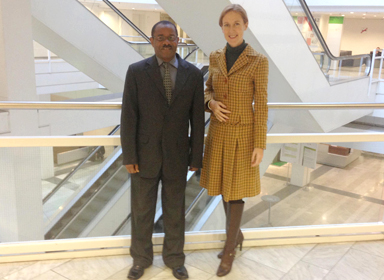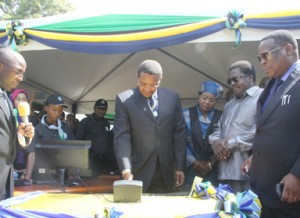The Hon. Pereira A. Silima is a member of Parliament for Chumbuni constituency, Zanzibar from 2010 up until 2015. He has been Deputy Minister at the Ministry of Home Affairs since May 2012 to date, handling all matters related to refugee services, prison service, fire and rescue services, community service, and the National Identification Authority (NIDA). His main role is to assist the Minister for Home Affairs running ministry’s political affairs including parliamentary issues. From 2010 to 2012 he was Deputy Minister at the Ministry of Finance.
Interview with Hon. Pereira A. Silima, Deputy Minister of Home Affairs, Tanzania
 The African continent seems to have woken up to a season of consistent development, and sees the wave of digitalization bring ashore numerous important projects, even where ICT infrastructures are still under creation or completion. eIDs are among the main elements introduced by countries throughout the region, to create a basis for efficient and transparent e-government exchanges, and for carrying out secure transactions in the public and private domains.
The African continent seems to have woken up to a season of consistent development, and sees the wave of digitalization bring ashore numerous important projects, even where ICT infrastructures are still under creation or completion. eIDs are among the main elements introduced by countries throughout the region, to create a basis for efficient and transparent e-government exchanges, and for carrying out secure transactions in the public and private domains.
Tanzania is among the countries currently completing its National ID project. The Hon. Pereira Silima, Deputy Minister of Home Affairs, United Republic of Tanzania, illustrates how today’s programs aiming at the modernization of identities and of the national identity management systems have come a long way upwards in the priorities of government-driven initiatives.
What is the status of the National ID project in Tanzania?
Our National ID program aims to enroll all Tanzanian citizens and residents by the end of 2014. Biometrics data of each member of the population are being collected for the first time, and we profile citizens and residents in anticipation of creating a voters’ database to support the democratic elections scheduled to happen in 2015.
The project started in 2008, but its implementation has been really slow at the start. It was on the one hand very expensive, and on the other not seen as a priority back then.
But today’s government looks at the National ID program as one of the main priorities in its agenda and things are eventually progressing at the speed necessary to complete the project in a timely manner.
 Tanzania never had a formal identity system and even now the program is not about giving credentials to the citizens, as much as creating a database to gain valuable knowledge about the population. As we look at a number of programs that will support the development of our country, our government looks at this database as a key basis to start with as we work to embrace progress.
Tanzania never had a formal identity system and even now the program is not about giving credentials to the citizens, as much as creating a database to gain valuable knowledge about the population. As we look at a number of programs that will support the development of our country, our government looks at this database as a key basis to start with as we work to embrace progress.
What are the main drivers behind the introduction of eIDs in Tanzania?
eIDs increase security by many folds. They are instrumental to combat organized crime, illegal trade and known problems as civil service ghost workers and the losses in tax collection that derive from not knowing who is in our country and doing what. Beyond this they are instrumental in providing the means to each and every member in our population to be included in the country’s path towards prosperity. Secure IDs help each person to assert his or her identity overcoming the black spot of risk related to who will identify whom. This is particularly relevant when it comes to aspects such as access to loans. In the new trust model established, the government acts as guarantor of the trustworthiness of the identity declared by the carrier of the ID presented to the banker, enabling to lower the borrowing interests rates and issue more loans.
The overall objective we pursue by establishing a National database of identities is in fact that of economic growth. We involve the people in this path towards the country’s prosperity by controlling the income from taxes on the one hand, and by establishing efficient and accountable ways to implement social relief projects.
About 50% of the Tanzanian population still lives in poverty and the government trusts that transparent and well aimed interventions, accompanied by financial inclusion programs, will make a significant difference in the years to come, when it comes to enhancing the life conditions for all residents.
How is the National IDs’ database configured?
Tanzania is building up its database to have the opportunity of profiling its population in three main categories: locals (the Tanzanians), holders of a residence permit and refugees.
We segmented the country to start enrollment systematically in select locations and fields, such as main urban aggregates and civil servants as a professional segment. The profiling of the individual person to be enrolled in the new national register sees us work in parallel as a different group is assigned with the task of taking the biodata: 10 fingerprints, digital signature and photography.
At the end of the data collection process, a last step sees us authenticate the information submitted prior to issuing a secure credential to the individual profiled.
The record stored in our national register becomes the best basis of information to work with for the implementation of our eGovernment objectives, for supporting democratic elections and any citizen centric services issued also by other departments within the Tanzanian government. We thus are in the process of designing the database as an interface supporting the possibility for all Ministries to build relations with each member of the population effectively and securely.
Will eIDs also support and facilitate travel?
Indeed they will. In particular, the East African Community, comprising Burundi, Kenya, Rwanda, Tanzania and Uganda, who rapidly embraced concepts such as a Customs Union in 2005, a Common Market in 2010 and a Monetary Union, now plans for National IDs to be accepted as trusted credentials for travel around the region.

